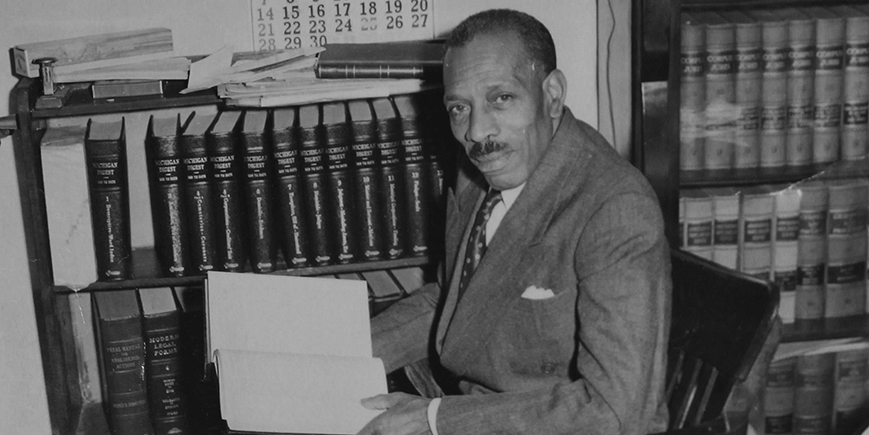Michigan Legal Milestones
The Michigan Legal Milestones program recognizes significant legal cases and personalities in Michigan's history and uses bronze plaques, placed at featured sites, to relate the historical significance. A new milestone is dedicated each year. The Legal Milestone plaques are on display across the state. Submit a nomination for a potential Michigan Legal Milestone.
The 44th Legal Milestone—Celebrating Percy J. Langster

About Percy J. Langster, America’s first Black prosecuting attorney
On November 2, 1948, Percy J. Langster made political and legal history by becoming the nation’s first Black prosecuting attorney when the people of Lake County, Michigan, elected him prosecutor.
Born in 1889, Langster grew up in Oil City, Pennsylvania, the only Black child in his borough. He left school at the age of 8 to support his disabled mother. While shining shoes, young Percy listened to local lawyers share courtroom tales, which sparked his lifelong dream of being an attorney. Langster returned to school and became a star athlete and debater at Oil City High School. After graduation, he attended Cornell University on an athletic scholarship, but soon left when funds ran out. For the next 16 years, Langster saved money to return to college by working blue-collar jobs, including as a Pullman porter. Finally, in 1924, Langster entered Duquesne University, graduating eight years later at the age of 43 with both his bachelor’s and law degrees, the first Black student to receive double degrees from the university.
In 1933, Langster moved to Woodland Park, Michigan. He was admitted to the State Bar of Michigan, opened a law practice, and served as the first Black educational advisor for the Civilian Conservation Corps. During World War II, he put his practice on hold to become a technical advisor for the Army Air Corps. After the war, Langster settled in Baldwin and reopened his law practice. Langster was 59 when he ran for Lake County prosecutor, facing off against a three-term incumbent in the predominantly white county. Langster beat the odds, and the incumbent, by 152 votes.
After his victory, Langster declared: “I campaigned for justice to all and bias towards no man. And somehow, I think, the people grasped hold of that idea.”
The 43rd Legal Milestone—Guaranteeing All Defendants' Right to Legal Counsel
Resources
Michigan Bar Journal: With trailblazing 1857 law, Michigan guaranteed all defendants' right to legal counsel
Complete Text on Milestone Marker
A step toward a better system of justice
The U.S. Bill of Rights guarantees the right to legal counsel for anyone accused of a crime. Attorneys have an ethical obligation to assist in meeting the legal needs of the poor and do so in many ways. While they have always worked to uphold the 6th Amendment’s right to counsel guarantee, they themselves had no guarantee of being paid anything at all for their work for poor defendants.
Allegan County Prosecutor Gilbert Moyers recognized that a constitutional right that depended entirely on lawyers’ free service was not sustainable or fair. When he was elected to the Michigan Senate in 1856, Moyers took a critical step toward improving Michigan’s criminal justice system by ensuring that people accused of crimes were represented by compensated attorneys. He introduced a bill to provide court-appointed attorneys $25 for murder cases, $10 for other felonies, and $5 for misdemeanor cases. A lawyer “compelled to follow a case into another county of into the Supreme Court” could “recover an enlarged compensation.” The bill became Public Act 109 of 1857 just a month after being introduced.
Efforts to promote equal and meaningful access to justice in Michigan continue to this day, and lawyers continue to contribute to the goal of access to justice for all.
Placed by the State Bar of Michigan, and the Allegan County Bar Association 2022
